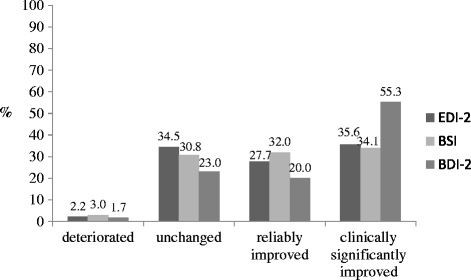Specialized inpatient treatment of adult anorexia nervosa: effectiveness and clinical significance of changes
- PMID: 25193513
- PMCID: PMC4172844
- DOI: 10.1186/s12888-014-0258-z
Specialized inpatient treatment of adult anorexia nervosa: effectiveness and clinical significance of changes
Abstract
Background: Previous studies have predominantly evaluated the effectiveness of inpatient treatment for anorexia nervosa at the group level. The aim of this study was to evaluate treatment outcomes at an individual level based on the clinical significance of improvement. Patients' treatment outcomes were classified into four groups: deteriorated, unchanged, reliably improved and clinically significantly improved. Furthermore, the study set out to explore predictors of clinically significant changes in eating disorder psychopathology.
Methods: A total of 435 inpatients were assessed at admission and at discharge on the following measures: body-mass-index, eating disorder symptoms, general psychopathology, depression and motivation for change.
Results: 20.0-32.0% of patients showed reliable changes and 34.1-55.3% showed clinically significant changes in the various outcome measures. Between 23.0% and 34.5% remained unchanged and between 1.7% and 3.0% deteriorated. Motivation for change and depressive symptoms were identified as positive predictors of clinically significant changes in eating disorder psychopathology, whereas body dissatisfaction, impulse regulation, social insecurity and education were negative predictors.
Conclusions: Despite high rates of reliable and clinically significant changes following intensive inpatient treatment, about one third of anorexia nervosa patients showed no significant response to treatment. Future studies should focus on the identification of non-responders as well as on the development of treatment strategies for these patients.
Figures


References
-
- Zipfel S, Wild B, Gross G, Friederich H-C, Teufel M, Schellberg D, Giel KE, de Zwaan M, Dinkel A, Herpertz S, Burgmer M, Löwe B, Tagay S, von Wietersheim J, Zeeck A, Schade-Brittinger C, Schauenburg H, Herzog W, ANTOP study group Focal psychodynamic therapy, cognitive behaviour therapy, and optimised treatment as usual in outpatients with anorexia nervosa (ANTOP study): randomised controlled trial. Lancet. 2014;383(9912):127–137. doi: 10.1016/S0140-6736(13)61746-8. - DOI - PubMed
-
- Herpertz-Dahlmann B, Schwarte R, Krei M, Egberts K, Warnke A, Wewetzer C, Pfeiffer E, Fleischhaker C, Scherag A, Holtkamp K, Hagenah U, Bühren K, Konrad K, Schmidt U, Schade-Brittinger C, Timmesfeld N, Dempfle A. Day-patient treatment after short inpatient care versus continued inpatient treatment in adolescents with anorexia nervosa (ANDI): a multicentre, randomised, open-label, non-inferiority trial. Lancet. 2014;383(9924):1222–1229. doi: 10.1016/S0140-6736(13)62411-3. - DOI - PubMed
MeSH terms
LinkOut - more resources
Full Text Sources
Other Literature Sources
Medical

